About His House – 9th Street Treatment Center
For detox, His House – 9th Street Treatment Center offers medication assisted treatment using FDA approved medications, as needed. A physician performs an assessment and decides on the medication type and dosage to be used.
The residential treatment program at His House provides 24 hour supervision, with staff that includes psychotherapists, pastors, house managers and a nutritionist/chef. Outdoor exercise and yoga are available. Treatment includes individual, group and family counseling sessions as well as educational groups, Bible classes and 12 Step programming. Many of the staff members have been in recovery themselves, so they have an empathetic understanding of clients’ needs.
His House offers alumni programming with 12 Step meetings. These aftercare services help promote long term recovery.
His House is in network with many major insurance providers including Aetna, Blue California, Cigna, Humana, Magellan, Beacon Health Options and Health Net. To verify your coverage, contact your insurance provider, as out of network benefits often vary.
Latest Reviews
Rehab Score
Gallery

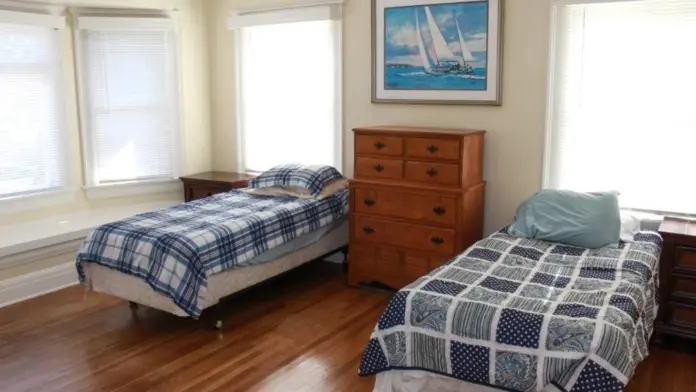
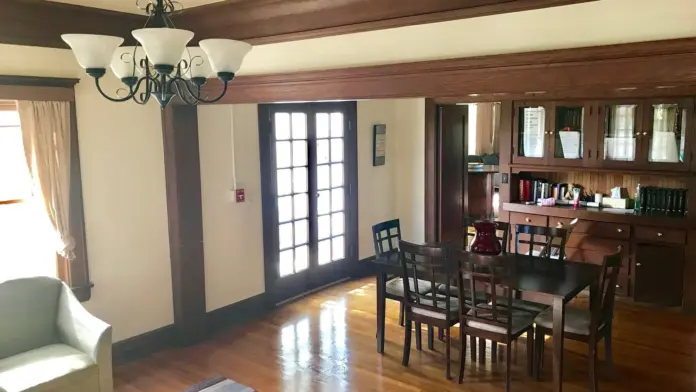
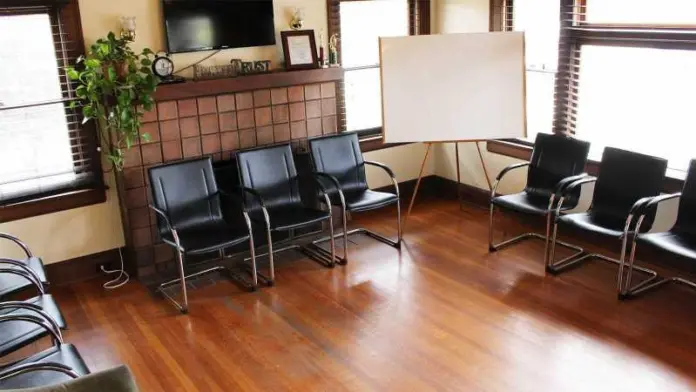
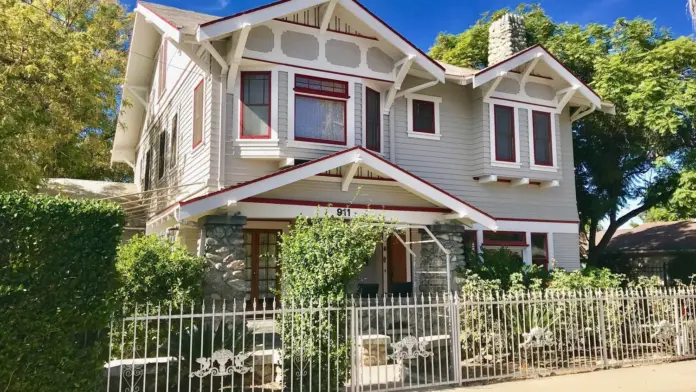


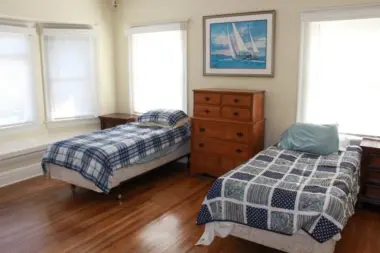
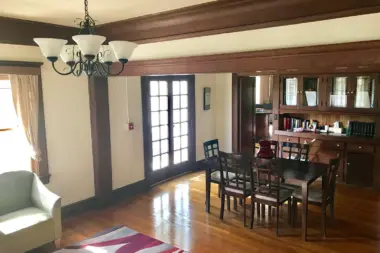
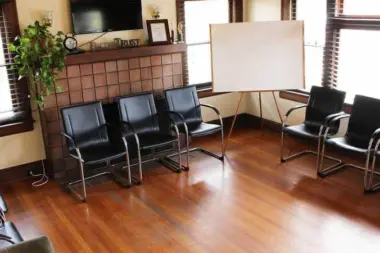
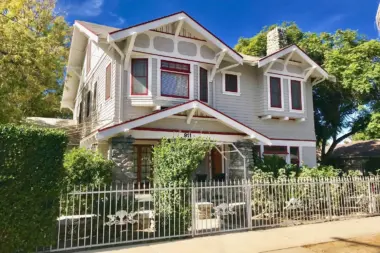

Accepted Insurance


Other Forms of Payment
Private insurance refers to any kind of healthcare coverage that isn't from the state or federal government. This includes individual and family plans offered by an employer or purchased from the Insurance Marketplace. Every plan will have different requirements and out of pocket costs so be sure to get the full details before you start treatment.
Self-pay involves paying for treatment out of your own pocket. You can use savings or credit, get a personal loan, or receive help from family and friends to fund your treatment. If you don't have insurance or your insurance plan doesn't cover a specific program, self-pay can help ensure you still get the care you need.
Sliding scale payments are based on a client's income and family size. The goal is to make treatment affordable to everyone. By taking these factors into account, addiction recovery care providers help ensure that your treatment does not become a financial burden to you or your family, eliminating one barrier to care.
Military members, veterans, and eligible dependents have access to specific insurance programs that help them get the care they need. TRICARE and VA insurance can help you access low cost or no cost addiction and mental health treatment. Programs that accept military insurance often have targeted treatment focused on the unique challenges military members, veterans, and their families face.
Addiction Treatments
Levels of Care
Outpatient Programs (OP) are for those seeking mental rehab or drug rehab, but who also stay at home every night. The main difference between outpatient treatment (OP) and intensive outpatient treatment (IOP) lies in the amount of hours the patient spends at the facility. Most of the time an outpatient program is designed for someone who has completed an inpatient stay and is looking to continue their growth in recovery. Outpatient is not meant to be the starting point, it is commonly referred to as aftercare.
Their residential programs provide clients the chance to be involved and work together with other clients who share the same afflictions. As a community, clients can socialize and get inspiration from other recovering clients, while simultaneously receiving all the necessary aid and assistance necessary for successful recovery from addiction.
Intensive outpatient programs (IOP) support a client's sustained sobriety as they exit detox or step down from an inpatient program. IOPs are also designed for clients who are at an elevated risk of relapse. Intensive outpatient treatment typically requires clients to engage in a minimum of nine hours of therapy per week, but clients may receive up to 20 therapeutic hours weekly. IOP treatment modalities often combine psychotherapy, recovery-focused life skills training, and medication assisted treatment (MAT).
Rehab aftercare programs offer clients in addiction recovery a robust continuum of care after clients have completed active treatment. These services address recovery as a life-long process and are designed to evolve with clients' changing needs. Clients may partner with their case managers and/or addiction recovery team to identify the rehab aftercare services that are right for them. They may receive career counseling, housing assistance, peer coaching, 12 step program induction, among many other services.
Participants engaged in 12 step programs receive intensive peer coaching (sponsorship) and community support. Spiritual development as a means of achieving psychological and emotional healing and growth is the cornerstone of 12 step recovery, but religious affiliations are not required. Meetings are free, anonymous, and open to the public, though specialized formats are available, including groups for seniors, teens, and family members. Evening, night, and day meetings are conducted year-round in most communities.
Sober Living Houses (SLHs), aka sober homes or halfway houses, are safe, substance-free, supportive living facilities for those recovering from substance abuse. Ideal for those who've just been through inpatient or outpatient treatment, SLHs are supervised environments with rules that support sobriety, such as curfews, shared chores, and therapeutic meetings. Residents are also often trained on life skills and coping skills to make it easier to transition into society. SLHs also provide a strong sense of community that can lead to the kind of deep and lasting connections with other sober individuals that supports a new, healthy lifestyle.
At certain points in the recovery process, it's important to have support available 24/7. 24-hour clinical care offers a safe environment in which to recover from drug or alcohol addiction in peace, knowing medical detox and other treatment will happen with professionals on hand.
At His House, their detox specialists will be able to assess and determine the ways in which your personal detoxification process should progress. Their team will formulate a treatment plan that adheres to your unique situation. Some factors that help us serve your detox efficiently are: types or combinations of drugs used and necessary comfort medications to help you through the process.
Treatments
They understand that many individuals struggling with substance addiction also suffer from underlying emotional issues such as depression or anxiety. Their dual-diagnosis programs provide a two-prong approach treatment methodology to help their clients make a full recovery and supply them with the tools to continue a happy, clean, and sober lifestyle.
The objectives of His House's mental health focus is providing relief from the symptoms of the emotional issue, help to plan treating the issue through various holistic approaches, address behaviors which harm their client's lifestyle, and enhancing vocational and social functioning skills.
Programs
Adult rehab programs include therapies tailored to each client's specific needs, goals, and recovery progress. They are tailored to the specific challenges adult clients may face, including family and work pressures and commitments. From inpatient and residential treatment to various levels of outpatient services, there are many options available. Some facilities also help adults work through co-occurring conditions, like anxiety, that can accompany addiction.
Young adulthood can be an exciting, yet difficult, time of transition. Individuals in their late teens to mid-20s face unique stressors related to school, jobs, families, and social circles, which can lead to a rise in substance use. Rehab centers with dedicated young adult programs will include activities and amenities that cater to this age group, with an emphasis on specialized counseling, peer socialization, and ongoing aftercare.
Recovery is most successful when clients feel accepted and validated by their peers and treatment providers. Facilities that offer LGBTQ-inclusive programming are committed to creating a safe space where everyone can grow and recover without fear of judgment or discrimination. They will have dedicated policies in place to create a safe and supportive environment that fosters free expression.
Clinical Services
CBT is a type of psychotherapy that aims to change negative thinking and behavior. The basic concept of CBT is that a person’s thoughts and feelings influence his behavior. During treatment, their clients learn how to distinguish and change disturbing and destructive behaviors.
DBT emphasizes individual psychotherapy and group skills training-classes to help clients learn and use new skills and strategies to develop a life that they experience as worth living. DBT skills include skills for mindfulness, emotion regulation, distress tolerance, and interpersonal effectiveness.
There are many types of group therapy a person can choose from in their curriculum depending on the condition and preferences. This type of therapy provides individuals necessary information that could help them identify roadblocks and cope with their disease. Psychoeducational group therapy instills self-awareness in our clients.
Their clients are assigned an entire team of treatment professionals to help create a treatment plan that suits their individual needs. They believe every client is to experience a unique process in healing. Their programs have a focus on individual treatment and therapy to ensure their clients never feel lost in a shuffle.
Motivational Interviewing (MI) is a clinical approach to helping people with substance abuse issues and other conditions shift behavior in positive ways. It is more goal-oriented than traditional psychotherapy, as MI counselors directly attempt to get clients to consider making behavioral change (rather than wait for them to come to conclusions themselves). Its primary purpose is to resolve ambivalence and help clients become able to make healthy choices freely.
Trauma therapy is a structured approach used by therapists to help you heal from a past traumatic event. Your therapist works with you to identify the traumatic memory and process the information so you experience emotional healing and a sense of safety and stability.
The goal of couples therapy in California is to strengthen the couple's relationship. The therapist may take one or more approaches to counseling which may include the Gottman method, emotionally focused therapy, behavioral therapy, and psychodynamic couple's therapy.
Research clearly demonstrates that recovery is far more successful and sustainable when loved ones like family members participate in rehab and substance abuse treatment. Genetic factors may be at play when it comes to drug and alcohol addiction, as well as mental health issues. Family dynamics often play a critical role in addiction triggers, and if properly educated, family members can be a strong source of support when it comes to rehabilitation.
To overcome challenges, their clients are taught to employ new mental practices, in-depth self-observation and a focus on building and sharpening life skills. Their treatment team guides the individual, helping them determine positive attributes while weeding out negative influences.
Having access to the team nutritionist during treatment can help their clients thrive in many different ways. An important part of the recovery process for each person that goes through it is physical healing. The best way to allow your body to heal is to take it easy and provide your body with all of the vitamins, minerals, and nutrients it needs to begin healing physically, while your therapy helps you heal mentally and emotionally.
Recreational therapy is included in alcohol and drug addiction treatment to focus on engaging you in healthy activities that reduce your cravings and improve your overall health and well being. When you participate in group sports, art, or nature walks, you develop new interests and find a meaningful way to spend your time and reduce your cravings.
The goal of nicotine replacement therapy in California is to mitigate the symptoms of nicotine withdrawal. It cuts down on your cravings by supplying a small dose of nicotine without exposing your body to the toxins of cigarette smoke.
Amenities
-
Yoga Studio
-
Private Rooms
Accreditations

The Joint Commission, formerly known as JCAHO, is a nonprofit organization that accredits rehab organizations and programs. Founded in 1951, the Joint Commision's mission is to improve the quality of patient care and demonstrating the quality of patient care.
Joint Commission Accreditation: Yes
Accreditation Number: 592844
Contact Information
239 W. 9th Street
Upland, CA 91785






